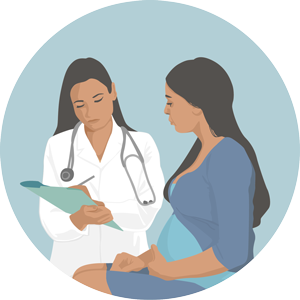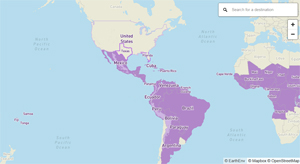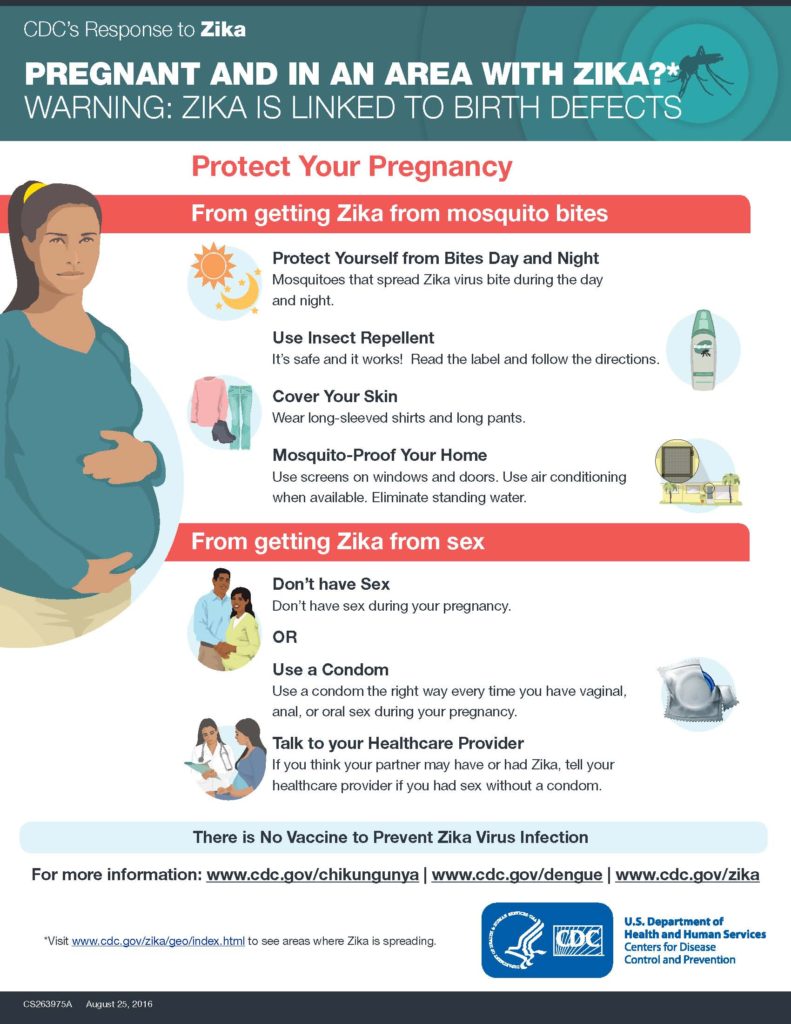What We Know
- Zika virus can be passed from a pregnant woman to her fetus.
- Zika infection during pregnancy can cause a birth defect called microcephaly and other severe fetal brain defects.
- Zika primarily spreads through infected mosquitoes. You can also get Zika through sexwithout a condom with someone infected by Zika, even if that person does not show symptoms of Zika.
- There is no vaccine to prevent or medicine to treat Zika.
How to Protect Yourself
CDC recommends special precautions for pregnant women.
Do Not Travel to an Area with Risk of Zika
- Pregnant women should not travel to areas with risk of Zika (i.e., with documented or likely Zika virus transmission).
- Pregnant women should consider postponing travel to yellow cautionary areas in the United States. For information on domestic travel, see CDC’s guidance.
What to Do If You Live In or Travel to an Area with Risk of Zika
If you live in or must travel to one of these areas, talk to your doctor or other healthcare provider first and strictly follow steps to prevent mosquito bites and practice safe sex.
During travel or while living in an area with risk of Zika
- Take steps to prevent mosquito bites.
- Take steps to prevent getting Zika through sex by using condoms from start to finish every time you have sex (oral, vaginal, or anal) or by not having sex during your entire pregnancy.
After travel
- Talk to a doctor or other healthcare provider after travel to an area with risk of Zika.
- If you develop a fever with a rash, headache, joint pain, red eyes, or muscle pain talk to your doctor immediately and tell him or her about your travel.
- Take steps to prevent mosquito bites for 3 weeks after returning.
- Take steps to prevent passing Zika through sex by using condoms from start to finish every time you have sex (oral, vaginal, or anal) or by not having sex.
Zika Testing for Pregnant Women
| If you… | When to talk with your doctor | When to be tested |
|---|---|---|
| Traveled to areas with risk of Zika that have a CDC Zika travel notice | Talk to a doctor or other healthcare provider after travel even if you don’t feel sick. | You should be tested for Zika when you return from travel. CDC recommends testing for pregnant women with and without Zika symptoms. |
| Traveled to areas with risk of Zika but no CDC Zika travel notice | Talk to a doctor or other healthcare provider after travel even if you don’t feel sick. | You should be tested if you develop symptoms of Zika or if your fetus has abnormalities on an ultrasound that might be related to Zika infection. Because the level of risk of Zika is unknown in areas with Zika risk but no Zika travel notice, routine testing is not recommended for pregnant women who have traveled to those areas and who do not have symptoms. However, your doctor may offer testing based on your individual situation. |
| Live in an area with risk of Zika that has a CDC Zika travel notice | Talk to a doctor or other healthcare provider throughout your pregnancy. | You may be at risk of getting Zika throughout your pregnancy. For this reason, doctors or other healthcare providers should offer testing
If you have symptoms of Zika at any time during your pregnancy, you should be tested for Zika. |
For more information, please visit: https://www.cdc.gov/zika/pregnancy/protect-yourself.html



No Comments